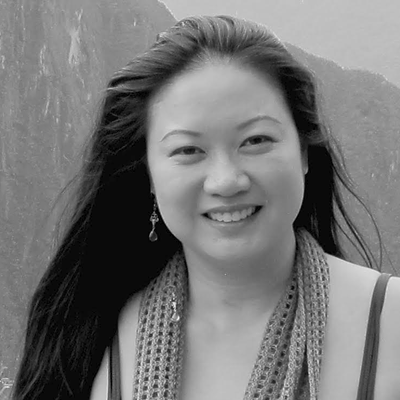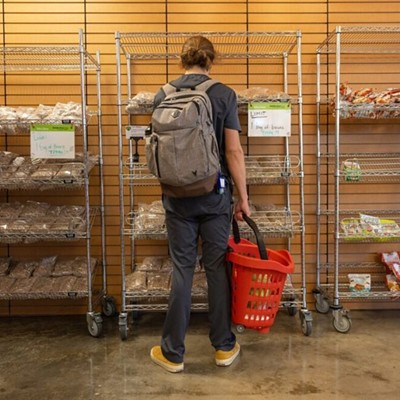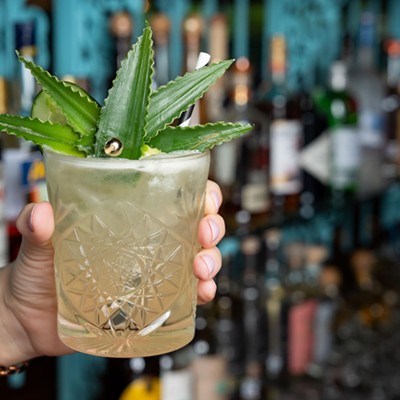David Cordua, at 29, is currently Executive Chef at Americas River Oaks, and all of the restaurants in the Cordua Restaurant Group.
Contrary to what some might assume, despite growing up as the son of a restauranteur, there wasn't an expectation for him to grow up and take over the family business. In fact, it wasn't until after college that he pursued a life in the culinary arts.
Last week, we caught up with this Cordon-Bleu trained native Houstonian for a chat about growing up in the Cordua family and his road to becoming a chef.
EOW: How old were you when the first Churrascos opened?
DC: I was six. In the first 3-4 years the whole family lived at the the restaurant. We had to. It was my dad and his brother, and my mom did the bookkeeping. We were there night and day.
EOW: Was there any expectation that you go in the business? Did they subliminally encourage you at all?
DC: My dad would bring me along on trips with the chefs, once a year, we'd all go to New York and eat our way with the city. So it'd be all the chefs and me.
EOW: That's a tradition your dad [Michael Cordua] started, right?
DC: These culinary trips, yes. And usually it was because he was cooking at the James Beard House or invited to cook at a resort somewhere. He'd bring his whole team with him, and we'd use it as research. So that was probably the only the sort of subtle hint, but what it did is it developed my palate at young age and got me really, really into food.
EOW: What sort of experience did you have in the kitchen, then, while growing up?
DC: Just spending summers in the family restaurants. I did one summer at Americas on Post Oak, another summer at Churrascos on Westheimer. But other than that, seeing Amazon Grill open up before leaving for college.
EOW: So where did you go to college?
DC: I did undergrad at Santa Clara and started working as a line cook at a hotel, the Hotel Valencia, under Mercer Mohr. I was a breakfast cook. I did room service there. And then I worked in Santa Rosa and Sonoma.
EOW: So why did you choose these jobs? Was it just means to an end -- you were in college and you just needed a job?
DC: I'll be honest with you. I was dead set most of my school life that I was going to be a musician.
EOW: Really? What kind of music?
DC: I played in a jazz funk band in college. I played guitar and sang vocals. In highschool, I played in band -- we played Fitzgerald's, Last Concert Cafe -- and we were kind of all Phish heads. We liked sort of jam band kind of music. So that was my first love, and what I found with food is that I got same instant gratification of creating something and seeing someone's reaction right away. It's not one of those things where I have a project and have to wait a month from now to know if I did well or not. You get feedback right away. If it's not from someone's comments, it's whether they came back.
EOW: So you went to school for...
DC: Finance. I did it because it was practical. I kind of justified that it was rounding me out because I'm so right brained. I thought business school would be something that would balance me out. It's that question whether you focus on your strengths or you focus on your weaknesses. And I was focusing on a weakness. In retrospect, I should have focused on a strength.
EOW: So, you finished school, and you're not going to go into finance...
DC: So I applied to culinary school at the Cordon Bleu in Paris. I packed up my bags two months after graduation and went there without knowing any French.
EOW: Do you speak french now? Tu parles français maintenant?
DC: Conversationelle. Un petit peu. Je peux pas écrire, mais après quelques boissons, peut-être [Conversationally. A little bit. I can't write, but after a few drinks, maybe]. So I had to learn quick. The first semester is with an English translator, and then they cut you off, you're on your own. It was pretty intensive. It was six days a week from 7 a.m. to 6 p.m., and worked three jobs while I was there also.
EOW: So at Le Cordon Bleu what are they teaching you?
DC: It's basic technique, then you move into intermediate, which is learning regional cuisine of France. First level is sort of general technique -- butchering, breaking up fish. Then intermediate we'd go into Southwest region of France, we'd go into Provencal cuisine, which was really cool. And then the advanced course was global cuisine. So you'd get into some Asian cuisine, Latin cuisine.
DC: How long is it before you graduate Le Cordon Bleu?
EOW: The whole program was one year. And that's what attracted me to it. I'd already gotten an undergraduate degree. This was something I could do quickly and start working right away. But I was in France for two years total.
EOW: So after school, you worked?
DC: I worked at La Tour D'Argent. Old School French. I worked at a neighborhood bistro called L'Auberge Bressane, that focused on the cuisine of Bresse, so very poultry focused. And then worked at an Italian Restaurant doing pizza and fresh pasta.
EOW: I'm surprised you chose La Tour D'Argent.
DC: The whole reason for France to begin with was to learn what I felt was the classic, classic technique. I wanted to learn mother sauces the way they were originally intended, not the way they'd been translated over the years. That was the intent, and La Tour D'Argent epitomized that. Some of the recipes have been there for hundreds of years. Granted, I was a peon there and did all the work that no one wanted to do.
EOW: What did you do?
DC: My first week there, I remember there was a mountain of bulot. They were these sea snails that I had to poach, remove from the shells and then mince by hand. I couldn't use a food processor -- the chef wouldn't let me use a food processor -- so had to mince 20 pounds of sea slugs that we would mix with a curry sauce and a fill a little pâte à choux that someone would just pop into their mouth.
Check back with us tomorrow as we talk about Cordua's role as Executive Chef at Cordua Restaurant Group and some of his favorite places to eat in Houston.






